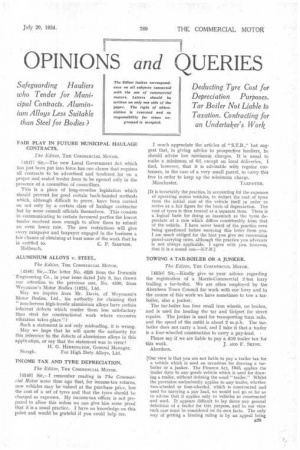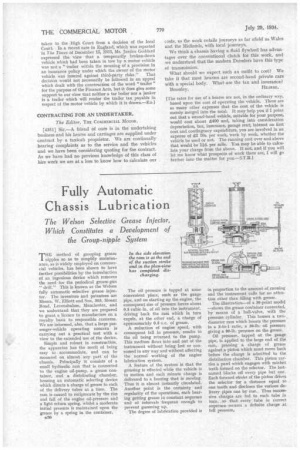OPINIONS and QUERIES
Page 43

Page 44

If you've noticed an error in this article please click here to report it so we can fix it.
FAIR PLAY IN FUTURE MUNICIPAL HAULAGE CONTRACTS.
The Editor, THE COMMERCIAL MOTOR.
[4347] Sir,—The new Local Government Act which has just been put into force has one clause that requires all contracts to be advertised and tendered for on a proper and sealed tender form to be opened only in the presence of a committee of councillors.
This is a piece of long-overdue legislation which should prevent for good certain back-handed methods which, although difficult to prove, have been carried on not only by a certain class of haulage contractor but by some council officials themselves. This consists in communicating to certain favoured parties the lowest tender received soon enough to allow them to submit an even lower rate. The new restrictions will give every ratepayer and taxpayer engaged in the business a fair chance of obtaining at least some of the work that he
is entitled to. C. P. SIMPSON. Holbeach.
ALUMINIUM ALLOYS v. STEEL.
The Editor, THE COMMERCIAL MOTOR.
[43481 Sir,—The letter No. 4339 from the Duramin Engineering Co., in your issue dated July 6, has drawn Our attention to the previous one, No. 4330, from Weymann's Motor Bodies (1925), Ltd.
• May we inquire from Mr. Davis, of Weyrriann's Motor Bodies, Ltd., his authority for claiming that "non-ferrous high-tensile aluminium alloys have certain inherent defects which render them less satisfactory than steel for constructional work where excessive vibration takes-place"?
Such a statement is not only misleading, it is wrong. May we hope that he will quote the authority for this reference to the defects of aluminium alloys in this application, or say that the statement was in error? II. G. ItERRINGTON, General Manager. Slough. For High Duty Alloys, Ltd.
INCOME TAX AND TYRE DEPRECIATION.
The Editor, THE COMMERCIAL MOTOR.
[4349] Sir,—I remember reading in The Commercial Motor some time ago that, for income-tax returns, new vehicles may be valued at the purchase price, less the cost of a set of tyres and that the tyres should be charged as expenses. My income-tax officer is not prepared to allow this unless we can give him some proof that it is a usual practice. I have no knowledge on this point and would be grateful if you could help me.
I much appreciate the articles of " S.T.R.," but suggest that, in giving advice to prospective hauliers, he should advise low minimum charges. It is usual to make a minimum of lld, except on local deliveries., I find, however, that it is advisable with regular customers, in the case of a very small parcel, to carry this free in order to keep up the minimum charge.
Manchester. TAXPAYER.
[It is invariably the practice, in accounting fof the expenses of operating motor vehicles, to deduct the cost of tyres from the initial cost of the vehicle itself in order to arrive at a fair figure for the basis of depreciation. The cost of tyres is then treated as a separate item. There is a logical basis for doing so inasmuch as the tyres depreciate at a rate which differs considerably from that of the vehicle. I have never heard of the practice even being questioned before receiving this letter from you. I am much obliged for the hint you give me concerning parcel-carrying rates, although the practice you advocate is not always applicable. I agree with you, however, that it is a sound one.----S.T.R.]
TOWING A TAR-BOILER OR A JUNKER.
The Editor, THE COMMERCIAL MOTOR.
[43501 Sir,—Kindly give us your advice regarding the registration of a Morris-Commercial 2-ton lorry trailing a tar-boiler. We are often employed by the Aberdeen Town Council for work with our lorry and in the course of this work we have sometimes to tow a tarboiler, also a junker.
The tar-boiler has four small iron wheels, no brakes, and is used for heating the tar and Gripset for street repairs. The junker is used for transporting tram rails, and the speed of the outfit is about 2 m.p.h. The tarboiler does not carry a load, and I take it that a trailer is a four-wheeled construction to carry a pay-load.
Please say if we are liable to pay a £10 trailer tax for
this work. J. AND F. SKENE. Aberdeen.
[Our view is that you are not liable to pay a trailer tax for a vehicle which is used on occasions for drawing a tarboiler or a junker.. The Finance Act, 1933, applies the trailer duty to any goods. vehicle which is used for drawing a trailer, without defining the word "trailer." Whilst the provision undoubtedly applies to any trailer, whether two-wheeled or four-wheeled, which is constructed and used for carrying a pay load, we would not go so far as to advise that it applies only to vehicles so constructed and used. It appears difficult to lay down any general definition of a trailer for this purpose, and in our view each case must be considered on its own facts. The only way of getting a binding ruling is by an appeal being taken to the High Court from a decision of the local Court. In a recent case in England, which was reported in 'The Times of December 15, 1933, Mr. Justice Goddard expressed the view that a temporarily broken-down vehicle which had been taken in tow by a motor vehicle was not a "trailer within the meaning of a provision in an insurance policy under which the owner of the motor vehicle was insured against third-party risks." That decision would not necessarily be followed in an appeal which dealt with the construction of the word " trailer " for the purpose of the Finance Acts, but it does give some support to our view that neither a tar boiler nor a junker is a trailer which will render the trailer tax payable in respect of the motor vehicle by which it is drawn.—ED,]
CONTRACTING FOR AN UNDERTAKER.
The Editor, THE COMMERCIAL MOTOR.
14351] Sir,—A friend of ours is in the undertaking business and his hearse and carriages are supplied under contract by a taxicab proprietor. We are continually hearing complaints as to the service and the vehicles and we have been considering quoting for the contract. As we have had no previous knowledge of this class of hire work we are at a loss to know how to calculate our
costs, as the work entails journeys as far afield as Wales and the Midlands, with local journeys.
We think a chassis having a fluid flywheel has advantages over the conventional clutch for this work, and we understand that the modern Daimlers have this type of transmission.
What should we expect such an outfit to cost? We take it that most hearses are second-hand private cars with a special body. What are the tax and insurance?
Bromley. HEARSE.
[The rates for use of a hearse are not, in the ordinary way, based upon the cost of operating the vehicle. There are so many other expenses that the cost of the vehicle is merely merged into the total. It may help you if I point out that a second-hand vehicle, suitable for your purpose, would cost about £400 and, taking into consideration depreciation, tax, insurance, garage rent, interest on first cost and contingency expenditure, you are involved in an expense of £3 10s. per week, week by week, whether the vehicle be used or not. The running cost over and above that would be 1d, per mile. You may be able to calculate your charge from the above. If not, and if you will let me know what prospects of work there are, I will go further into the matter for you.—S.T.R.1




























































































